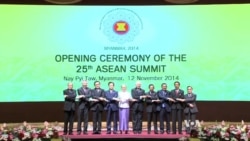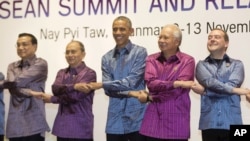President Barack Obama has arrived in Myanmar, also known as Burma, where regional leaders have opened the annual summit meeting of the Association of Southeast Asian Nations (ASEAN).
Obama arrived in Myanmar's capital, Nay Pyi Taw, Wednesday evening as the local magazine Irawaddy published an interview in which the U.S. leader said his hosts have made progress on some political and economic reforms, but also have gone backwards in some areas.
Other U.S. officials have echoed those views in recent weeks, and Obama is expected to raise those concerns during talks this week with President Thein Sein and opposition leader Aung San Suu Kyi.
Obama will first attend the East Asia Summit, beginning Thursday, which is a broader gathering of the 10 ASEAN countries plus eight other nations, including the U.S., China, Russia and India.
The ASEAN Summit opened with the host’s expressions of concern about unfulfilled goals and with the anthem of the organization - an unfamiliar song to which few of the leaders and Southeast Asian diplomats in attendance could sing along.
That reflects the current dilemma of ASEAN’s ten members. Some 48 years after its formation, the organization is still trying to define its goals and agree on harmonious policies for a diverse community of more than 600 million people.
The summit’s host, Myanmar’s president, made note of this in his opening speech.
Thein Sein cautioned that one year before the launch of the ASEAN Economic Community, which is supposed to create a single market, “challenges remain in implementing the remaining 20 percent of the targets and addressing the issues that will emerge in the post-2015 ASEAN Community.”
The president also stated ASEAN “needs to play a greater role in the international arena by taking a more united stand in addressing issues of common concern and interest.”
That was interpreted, in part, as referencing the frustration among some states with the slow pace of finalizing a code of conduct for the South China Sea.
The Philippines and Vietnam, in particular, have raised strong concern about maritime standoffs in the disputed waters involving Chinese vessels.
The ASEAN meeting will be followed Thursday by the ninth East Asia Summit.









